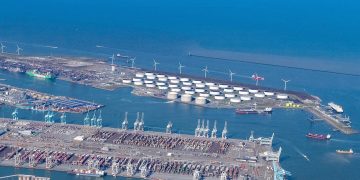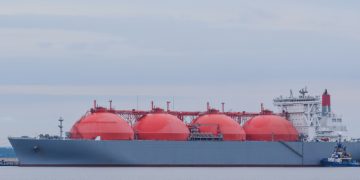In 2017, a small group of pioneering ports created an inventory ship-generated noise in berth, at anchor and manoeuvring to get in berth or leaving the berth. The project NEPTUNES – Noise Exploration Program To Understand Noise Emitted by Seagoing Ships – aims to mitigate the noise pollution from seagoing vessels by developing an universal measurement protocol, guidelines for noise labelling of vessels and a best practice guide for noise hindrance reduction measures.
Specifically, Frank Wolkenfelt, one of Project NEPTUNES’ key program participants, reported that the goal of the project is to place vessel noise on the table as another emission. Unfortunately, human activity produces underwater noise, which results to marine animals being unable to communicate.
Nowadays, ports are becoming more and more residential. Container, bulk and liquid terminals are handling ever larger volumes of cargo in terms of loading, discharge and transhipments from ever larger vessels.
[smlsubform prepend=”GET THE SAFETY4SEA IN YOUR INBOX!” showname=false emailtxt=”” emailholder=”Enter your email address” showsubmit=true submittxt=”Submit” jsthanks=false thankyou=”Thank you for subscribing to our mailing list”]
Ships alongside need a constant energy source to keep running and there is a entire chain of shore-based noise-generating machinery and equipment that serves them that are almost singularly focused on greenhouse gas and carbon emissions reductions.
The progress of the measurement protocol is based on the global standards and the experience of acoustic specialists with similar projects in other industries.
The protocol was trialled in seven ports, with 23 ships in total using a two-day audit and a report follow up for each, and was completed in the end of 2018.
Moreover, the project aspires to classify the emitted noise from various types of vessels based on their overall sound power level and the proportion of low frequency noise.
By creating a practical 1-100 scale based on scientific measurement with a high score designating a low noise vessel by type, the path is now open to integrate the label into the IAPH Environmental Shipping Index (ESI). The ESI has more than 7,000 ships on its register and has been adopted by some of the world’s largest ports to reward and incentivise shipowners with vessels that meet and exceed IMO emissions standards.
The results of the Project NEPTUNES will be further discussed in a conference, at the port of Rotterdam.
As Joop Smits, NEPTUNE Project head commented
The outcome will mark an important milestone for the NEPTUNES Project with the delivery of a practical guide to mitigate vessel noise in ports – certainly not the beginning of the end of this collaboration, but with the support of the industry and IAPH, the end of the beginning.



























































